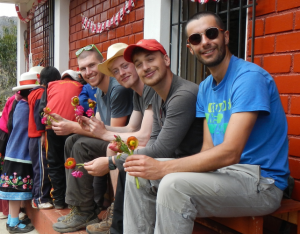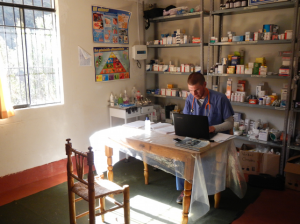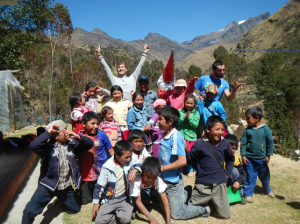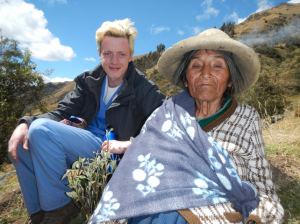Leeds Uni Medics Alex, Josh, Hugo and Paul have sent us this report on their time in Quishuar this summer
Our group, four medical students from the University of Leeds, visited Quishuar health post for our medical elective (a period of training where students are encouraged to work abroad). This lasted 5 weeks in July and August of 2015.
Before our arrival in Quishuar we had flown into Lima and spent 10 days visiting tourist attractions in the South of the country (because it isn’t a trip to Peru without a shameless ‘selfie’ overlooking Machu Picchu) before we returned to Lima then took the bus to Huaraz. We were met in the Cafe Andino (‘gringo’ hangout and purveyor of extremely large breakfasts) by Val and Paul, and after a quick catch up we began preparing for our stay in the health post. Over the next 2 days we acclimatised to the altitude in Huaraz whilst buying food for 5 weeks, spending 3 hours navigating multiple Peruvian pharmacies to re-stock the health post and assembling the kit required to make our way there.
 After a public bus ride to Yungay, riding on a truck into the Cordillera Blancas, staying overnight in Chingil and then a 4 hour walk over the pass, we finally reached Quishuar and were greeted by a procession of women in traditional dress dancing who guided us to the Health Post. This was followed by music from a drum, violin and harp, further dancing (which we joined with more enthusiasm than skill) and lunch to celebrate our arrival, followed by a brief set of speeches. All in all this was a lovely welcome to Quishuar and also a dive into the deep end of culture in the Cordillera Blancas.
After a public bus ride to Yungay, riding on a truck into the Cordillera Blancas, staying overnight in Chingil and then a 4 hour walk over the pass, we finally reached Quishuar and were greeted by a procession of women in traditional dress dancing who guided us to the Health Post. This was followed by music from a drum, violin and harp, further dancing (which we joined with more enthusiasm than skill) and lunch to celebrate our arrival, followed by a brief set of speeches. All in all this was a lovely welcome to Quishuar and also a dive into the deep end of culture in the Cordillera Blancas.
 Over the course of the 5 weeks we spent in Quishuar, we operated with two of us working with Tula (the nurse who works at the post) to run the clinic each day 9am – 5pm with the other two conducting home visits, doing odd jobs, and during the school holidays teaching the local children. The healthcare was very different to the UK, largely due to the difference in types of condition but also the health knowledge of the local population as well as the difference in available resources. However once we got in the swing, by familiarising ourselves with the stock of the health post and brushing up on our (non-existent for some of the group) Spanish we began to feel much more like GPs back at home.
Over the course of the 5 weeks we spent in Quishuar, we operated with two of us working with Tula (the nurse who works at the post) to run the clinic each day 9am – 5pm with the other two conducting home visits, doing odd jobs, and during the school holidays teaching the local children. The healthcare was very different to the UK, largely due to the difference in types of condition but also the health knowledge of the local population as well as the difference in available resources. However once we got in the swing, by familiarising ourselves with the stock of the health post and brushing up on our (non-existent for some of the group) Spanish we began to feel much more like GPs back at home.
The local population are subsistence farmers, and as a result of this the most common illnesses are back pain (from heavy lifting), worm infections (from poor hygiene), gastritis (from the worms, alcohol and poor diet) and sexually transmitted diseases (from poor sexual education). The vast majority of patients presented with at least one of these, as each patient tended to come with multiple problems since the culture is that of accessing healthcare only when absolutely necessary.
One case that particularly struck me was that of Maria, an older woman with rheumatoid arthritis. Maria had suffered with her condition for many years, largely losing the function of her hands and making it difficult at age 80 to continue to work on the farm! We saw her every week at her house, high up on the side of the valley overlooking the village, where we would check on her health and provide medication to aid the pain and inflammation for the next week. We could see she clearly valued this input, however small it was, and it was so nice to see the huge impact such a small intervention can have on an individual level. However this was also memorable because this level of progression could have been slowed dramatically by using medications which are commonly available in the UK, but completely out of reach for someone like Maria in Quishuar.
 In our free time, as well as enjoying the fantastic scenery, we spent our mornings teaching/entertaining primary school children by teaching basic English, hand hygiene, and more than a little football. In the afternoons the decidedly more shy secondary school children were also subjected to English lessons, as well as health education including sexual health and basic first aid. Later reports confirm that all the children in the village can now say “Hi, I am Carolina, I am 8 years old and that is red” but are unlikely to understand your response.
In our free time, as well as enjoying the fantastic scenery, we spent our mornings teaching/entertaining primary school children by teaching basic English, hand hygiene, and more than a little football. In the afternoons the decidedly more shy secondary school children were also subjected to English lessons, as well as health education including sexual health and basic first aid. Later reports confirm that all the children in the village can now say “Hi, I am Carolina, I am 8 years old and that is red” but are unlikely to understand your response.
Looking back, the health post is one thing that really makes Quishuar stand out from the surrounding villages. As well as the benefits of accessible healthcare which is utilised by people from many of those villages, it provides a meeting place and a centre of the village, being virtually the only place with street lighting. LED also provide a great deal in terms of support for local schools, and by providing solar lights they have given the village virtually all its supply of light after 6pm every day.
We had a really interesting experience in Quishuar, tough at times, moving at others but overall we are delighted to have contributed to LED’s cause of holistic improvement of the lives of those living in Quishuar. We return to the UK better medics and certainly grateful for the NHS and all it provides us.
Until next time!
Alex, Josh, Hugo and Paul
